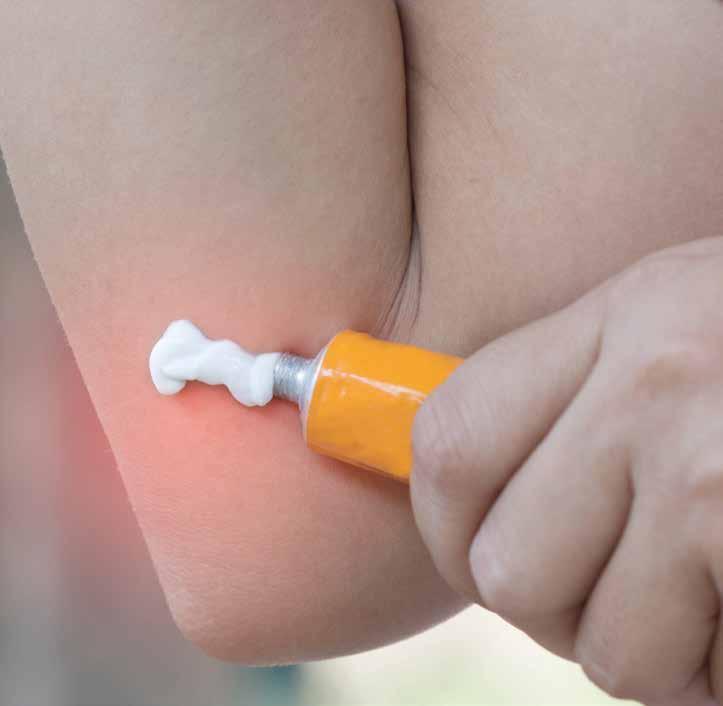
4 minute read
Reflux
INFANT REFLUX
Infant reflux occurs when food backs up (refluxes) from a baby’s stomach, causing the baby to spit up. Sometimes called gastroesophageal reflux (GER), the condition is rarely serious and becomes less common as a baby gets older. It’s unusual for infant reflux to continue after age 18 months. Reflux occurs in healthy infants multiple times a day. As long as the baby is healthy, content and growing well, reflux is not a cause for concern.
CAUSES
The muscle at the bottom of the food pipe acts as a kind of door into the stomach – so when food or milk travels down, the muscle opens allowing the food into the stomach. However, while this muscle is still developing in the first year, it can open when it shouldn’t (usually when a baby’s tummy is full) allowing some food and stomach acid to travel back up again. Acid in the stomach is normal and a necessary part of the digestion process – it helps break down food. In most babies, reflux is nothing to worry about (as long as they are healthy and gaining weight as expected). However, in some cases (though very few) reflux can cause a lot of pain when strong acid travels up into the food pipe. When reflux becomes painful and it happens frequently, this is known as ‘gastrooesophageal reflux disease’ (GORD).
SYMPTOMS
constant or sudden crying when feeding bringing up milk during or after feeds (regularly) frequent ear infections lots of hiccups or coughing refusing, gagging or choking during feeds poor weight gain
frequent waking at night
Reflux and Sleep
It is important that all parents know that night time sleeping problems are very common in refluxing infants. Research shows that 13% of infants over 3 months of age wake their parents three or more times a night, however a study completed on infants with GastroOesophageal Reflux Disease (GORD) found that 50 to 60% of infants over 3 months of age suffering from GORD woke their parents frequently at night. Sleep issues that can be due to reflux include:
Waking in the middle of the night with a burst of crying
Waking frequently overnight, a child may initially sleep for three or four hours, but then will wake every one or two hours for the rest of the night and be difficult to resettle
Infants and children may be more comfortable in a fully upright position and may object or cry when put to lie down Day time sleeping tends to be for short periods and usually are cat naps for 10 to 40 minutes with the child waking distressed; Older children with reflux can be restless during sleep and may cry, moan or swallow even when asleep.
ASSISTING AND ADVISING
Infant reflux usually clears up by itself. In the meantime, you can recommend the following to worried mums:
Giving the baby smaller, more-frequent feedings. Interrupting feedings to burp baby. Holding baby upright for 20 to 30 minutes after feedings. Eliminating dairy products, beef or eggs from mum’s diet if they are breast-feeding, to test if baby has an allergy. Switching the type of formula. Using a different size of nipple on baby bottles. A nipple that is too large or too small can cause a baby to swallow air. Thickening formula or expressed breast milk slightly and in gradual increments with rice cereal. Although recognized as a reasonable strategy, thickening adds potentially unnecessary calories to a baby’s diet.
TREATMENT
Medication
Reflux medications aren’t recommended for children with uncomplicated reflux. These medications can prevent absorption of calcium and iron, and increase the risk of certain intestinal and respiratory infections. However, a short-term trial of an acid-blocking medication — such as cimetidine (Tagamet HB) or famotidine (Pepcid AC) for infants ages 1 month to 1 year or omeprazole magnesium (Prilosec) for children ages 1 year or older — might be recommended if a baby:
Has poor weight gain and moreconservative treatments haven’t worked
Refuses to feed
Has evidence of an inflamed esophagus Has chronic asthma and reflux
When to Refer:
If the baby:
Isn’t gaining weight
Consistently spits up forcefully, causing stomach contents to shoot out of his or her mouth (projectile vomiting)
Spits up green or yellow fluid
Spits up blood or a material that looks like coffee grounds
Refuses food
Has blood in his or her stool
Has difficulty breathing or a chronic cough Begins spitting up at age 6 months or older Is unusually irritable after eating
W W H A M
Who? Newborn babies.
What are the symptoms? Hiccups, coughing, sudden crying, bringing up milk, poor weight gain.
How long has the patient had the symptoms? Can occur up to age 18 months.
Action already taken? Mums may already have tried switching feeds, feeding times, holding baby upright.











